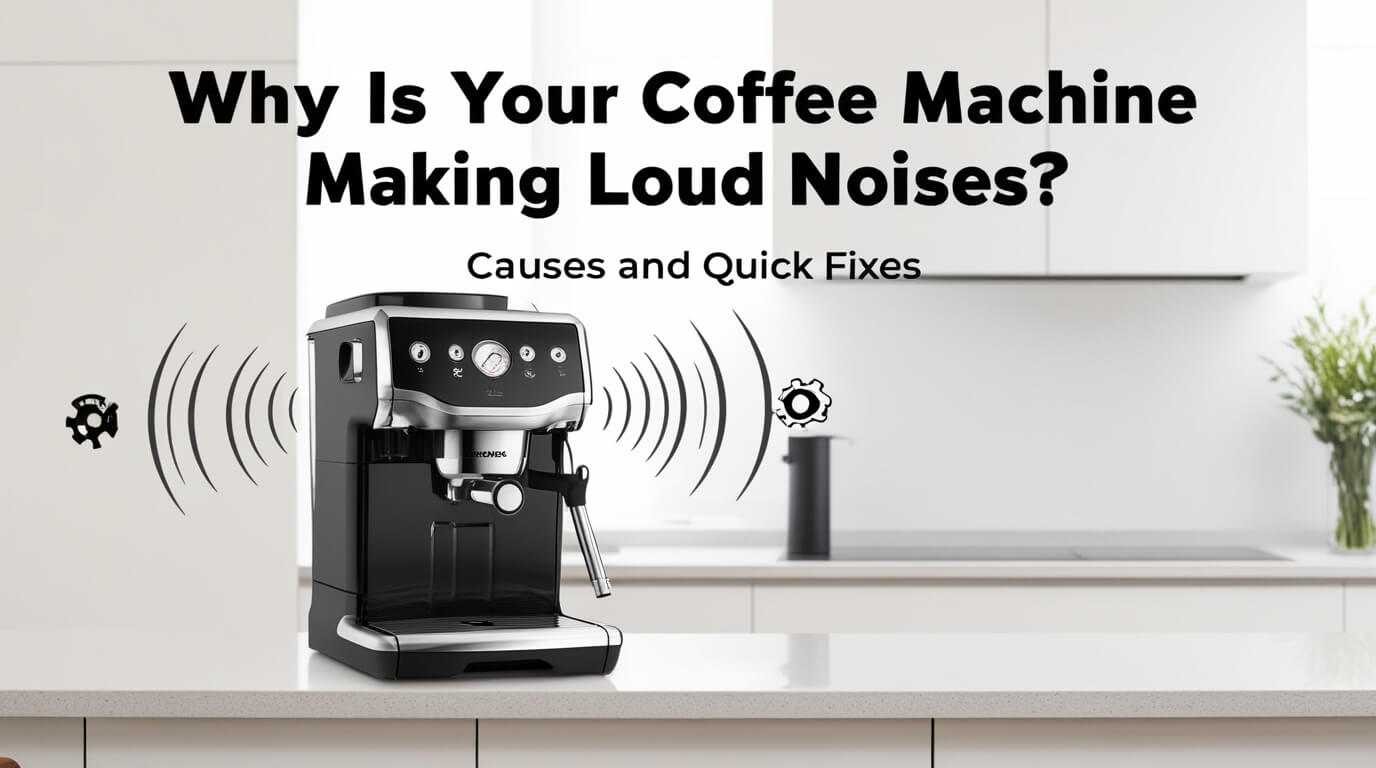
Are you startled by your coffee machine’s unexpected racket every morning? A noisy coffee maker can stem from various issues, including mineral buildup, worn parts, or air in the system. In this guide, we’ll explore why your coffee machine is making loud noises and how to fix these problems, ensuring your mornings start with a quiet brew.
Coffee machines have become an essential part of many households and offices. They provide us with our daily caffeine fix, but when they start making strange noises, it can be both annoying and concerning. Let’s dive into the world of coffee machine noises and uncover the reasons behind them.
Common Causes of Noisy Coffee Machines
Mineral Buildup and Scale
One of the main culprits behind a loud coffee machine is mineral buildup. Over time, minerals from water can accumulate inside your coffee maker, causing scale. This buildup can make your machine work harder, resulting in unusual noises.
Hard water areas are more prone to this issue. The calcium and magnesium in hard water leave deposits in your machine’s pipes and heating elements. As these deposits grow, they can restrict water flow and cause the pump to strain, creating loud noises.
Air in the System
Sometimes, air bubbles get trapped in your coffee machine’s water lines. When this happens, your machine might make gurgling or sputtering sounds as it tries to push water through the system.
This issue often occurs after you’ve moved your machine or when it hasn’t been used for a while. The good news is that it’s usually a temporary problem that resolves itself after a few brewing cycles.
Worn Out or Damaged Parts
Like any appliance, coffee machines have parts that can wear out over time. Pumps, valves, and seals can all deteriorate with regular use. When these components start to fail, they often produce strange noises.
For example, a worn-out pump might make a loud buzzing noise, while a damaged valve could cause hissing or whistling sounds. Regular maintenance can help prevent these issues, but sometimes parts simply need replacement.
Clogged Filters and Valves
Coffee grounds and oils can build up in your machine’s filters and valves, causing blockages. When water can’t flow freely through these components, it can lead to unusual noises as your machine struggles to push water through.
Regular cleaning is key to preventing this issue. Make sure to clean your machine’s removable parts after each use and perform deep cleans as recommended by the manufacturer.
Types of Noises and What They Mean
Grinding Sounds
If your coffee machine makes a grinding noise, it could be due to several factors:
- Coffee grinder issues (for machines with built-in grinders)
- Debris in the brewing mechanism
- Worn-out bearings in the pump or motor
For machines with grinders, make sure you’re using the right type of beans and that no foreign objects have made their way into the grinder. For other issues, a thorough cleaning or professional repair might be necessary.
Buzzing or Humming
A buzzing or humming noise often indicates a problem with the machine’s pump or motor. This could be due to:
- Mineral buildup affecting the pump’s performance
- A failing pump that needs replacement
- Loose components vibrating during operation
If descaling doesn’t solve the issue, you might need to have a professional check your machine’s pump and motor.
Hissing or Whistling
Hissing or whistling noises usually relate to steam or pressure issues:
- Steam escaping from a loose connection
- Pressure building up in clogged pipes
- A faulty pressure relief valve
These noises can indicate potentially dangerous issues, so it’s best to stop using the machine and have it checked by a professional if you hear persistent hissing or whistling.
Loud Pumping or Vibrations
Excessive pumping noises or vibrations might mean:
- The machine isn’t level on the counter
- Loose internal components
- A pump working too hard due to blockages
Start by ensuring your machine is on a stable, level surface. If the noise persists, check for any loose parts you can tighten, or consider descaling the machine to remove any blockages.
Troubleshooting a Loud Coffee Machine
Identifying the Source of the Noise
To fix a noisy coffee machine, you first need to pinpoint where the sound is coming from. Here’s how:
- Listen carefully during different stages of the brewing process
- Try to isolate the noise to a specific area of the machine
- Note when the noise occurs (e.g., only when grinding, during water heating, etc.)
This information will help you or a technician diagnose the problem more accurately.
Basic Maintenance Tips
Many noise issues can be resolved with some simple maintenance:
- Descale your machine regularly (every 3-6 months, depending on water hardness)
- Clean removable parts after each use
- Run a water-only cycle to flush out the system periodically
- Check and tighten any loose external screws or fittings
These steps can prevent many common causes of coffee machine noise and keep your appliance running smoothly.
When to Seek Professional Help
While many noise issues can be resolved at home, some require expert attention. Consider calling a professional if:
- You’ve tried basic troubleshooting and the noise persists
- The noise is accompanied by other problems (like leaks or poor coffee quality)
- You’re not comfortable disassembling or repairing the machine yourself
- Your machine is still under warranty
A qualified technician can diagnose complex issues and perform repairs safely, potentially saving you from costly mistakes.
Preventing Coffee Machine Noise Issues
Regular Cleaning and Descaling
Prevention is better than cure when it comes to coffee machine maintenance. Establish a cleaning routine:
- Wipe down the exterior daily
- Clean the carafe, filter basket, and other removable parts after each use
- Descale every 3-6 months, or as recommended by the manufacturer
- Deep clean internal components monthly
Regular cleaning prevents buildup that can cause noise and other issues, extending your machine’s lifespan.
Proper Water Quality and Usage
The water you use in your coffee machine can significantly impact its performance and noise levels:
- Use filtered or bottled water if you live in a hard water area
- Avoid using distilled water, as it can damage some machines
- Don’t overfill the water reservoir
- Change the water daily to prevent stagnation
Using the right water can reduce mineral buildup and help your machine run more quietly.
Timely Replacements and Upgrades
No coffee machine lasts forever. Consider replacing or upgrading your machine if:
- It’s more than 5-7 years old and frequently noisy
- Repairs are becoming more frequent and costly
- The noise is affecting your daily routine or enjoyment of coffee
Investing in a new, well-maintained machine can provide a quieter, more enjoyable coffee experience.
Different Coffee Machines and Their Typical Noise Levels
Espresso Machines
Espresso machines are known for being louder than other types due to their high-pressure brewing process. Typical noises include:
- Loud pump sounds during extraction
- Steaming and frothing noises
- Grinding noise (for machines with built-in grinders)
While some noise is normal, excessive or unusual sounds could indicate problems.
Drip Coffee Makers
Drip coffee makers are generally quieter than espresso machines. Common noises include:
- Gentle bubbling as water heats
- Soft gurgling as water flows through the grounds
- Occasional clicking of the heating element
Loud or persistent noises in a drip maker often signal a need for cleaning or repair.
Pod-Based Coffee Machines
Pod or capsule machines like Keurig or Nespresso usually produce:
- A brief, loud puncturing sound as the pod is pierced
- Pumping noises as water is forced through the pod
- Hissing as excess steam is released
These machines should operate relatively quietly overall, with noise lasting only a few seconds during brewing.
Manual Brewing Methods
Manual methods like French press or pour-over are the quietest options, producing minimal noise beyond:
- The sound of pouring water
- Gentle bubbling during steeping
- The press mechanism in a French press
These methods are ideal for those sensitive to noise or in shared living spaces.
Impact of Coffee Machine Noise on Daily Life
Sleep and Relaxation
A noisy coffee machine can disrupt your household’s peace, especially in the early morning or late at night. Consider:
- Placing your machine away from bedrooms
- Using a quieter brewing method for off-hours coffee
- Preparing your machine the night before to minimize morning noise
These strategies can help maintain a calm environment without sacrificing your coffee routine.
Workplace Environment
In an office setting, a loud coffee machine can be a significant distraction. To minimize impact:
- Schedule cleaning and maintenance during off-hours
- Place the machine in a separate break area if possible
- Consider upgrading to a quieter model for shared spaces
A quiet coffee machine contributes to a more productive and pleasant work environment.
Social Gatherings and Entertainment
During social events, a noisy coffee machine can interrupt conversations and ambiance. To avoid this:
- Brew coffee before guests arrive
- Use a quieter brewing method for gatherings
- Consider serving pre-made cold brew for large events
These approaches ensure your coffee service enhances, rather than detracts from, social occasions.
Quieter Alternatives: Low-Noise Coffee Machines
Features to Look for in Quiet Coffee Makers
If you’re in the market for a quieter coffee machine, consider these features:
- Insulated brewing chambers to muffle noise
- Low-vibration pumps
- Grind-control technology for gentler grinding
- Programmable start times to brew before you wake
These features can significantly reduce the noise level of your daily brewing process.
Top Quiet Coffee Machine Models
While specific models change over time, some brands known for quieter operation include:
- Breville Precision Brewer (for drip coffee)
- Jura E8 (for espresso)
- Technivorm Moccamaster (for drip coffee)
- De’Longhi Magnifica (for espresso)
Research current models and read user reviews to find the quietest option that meets your needs.
Conclusion
A noisy coffee machine doesn’t have to ruin your morning routine. By understanding the causes of these sounds and taking steps to prevent them, you can enjoy quieter, more pleasant coffee brewing. Regular maintenance, proper use, and timely repairs or replacements can keep your coffee machine running smoothly and quietly.
Remember, some noise is normal for coffee machines, especially espresso makers. But if the noise becomes excessive or changes suddenly, it’s time to investigate. With the tips and information provided in this guide, you’re now equipped to tackle most coffee machine noise issues and make informed decisions about maintenance and potential upgrades.
Here’s to quieter mornings and perfectly brewed coffee!






